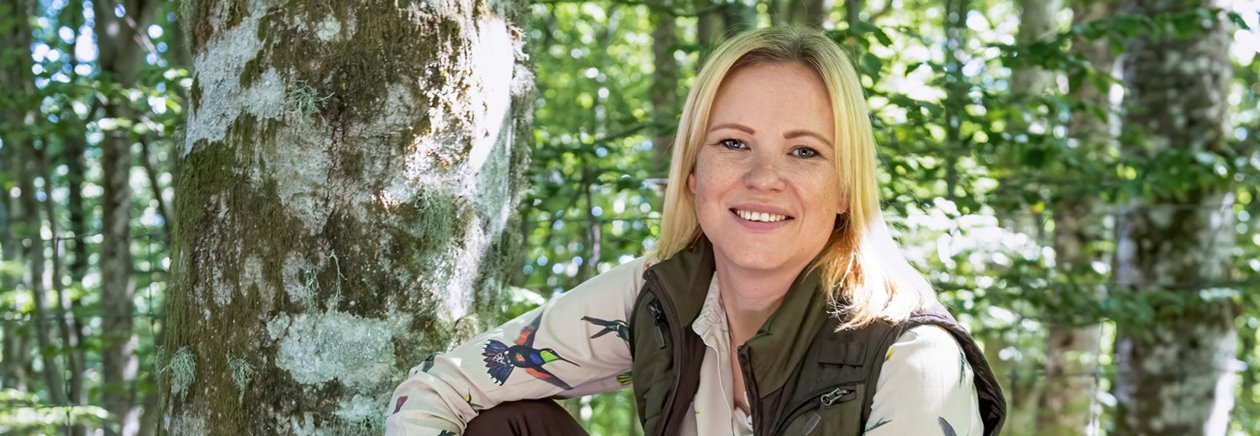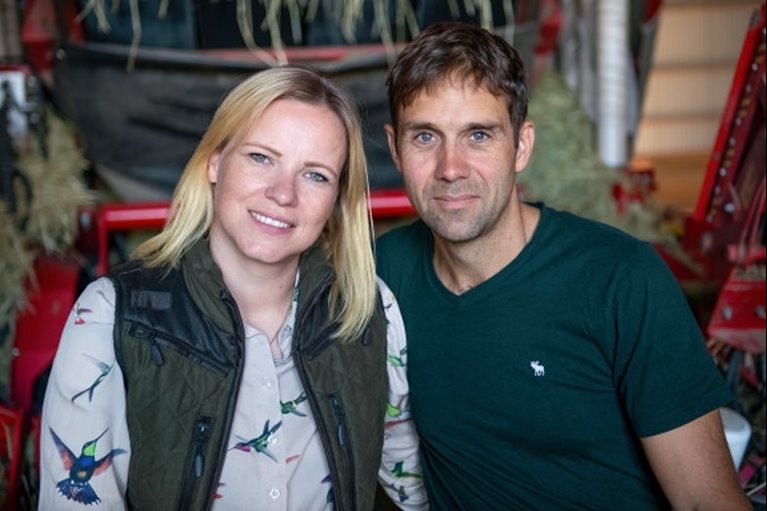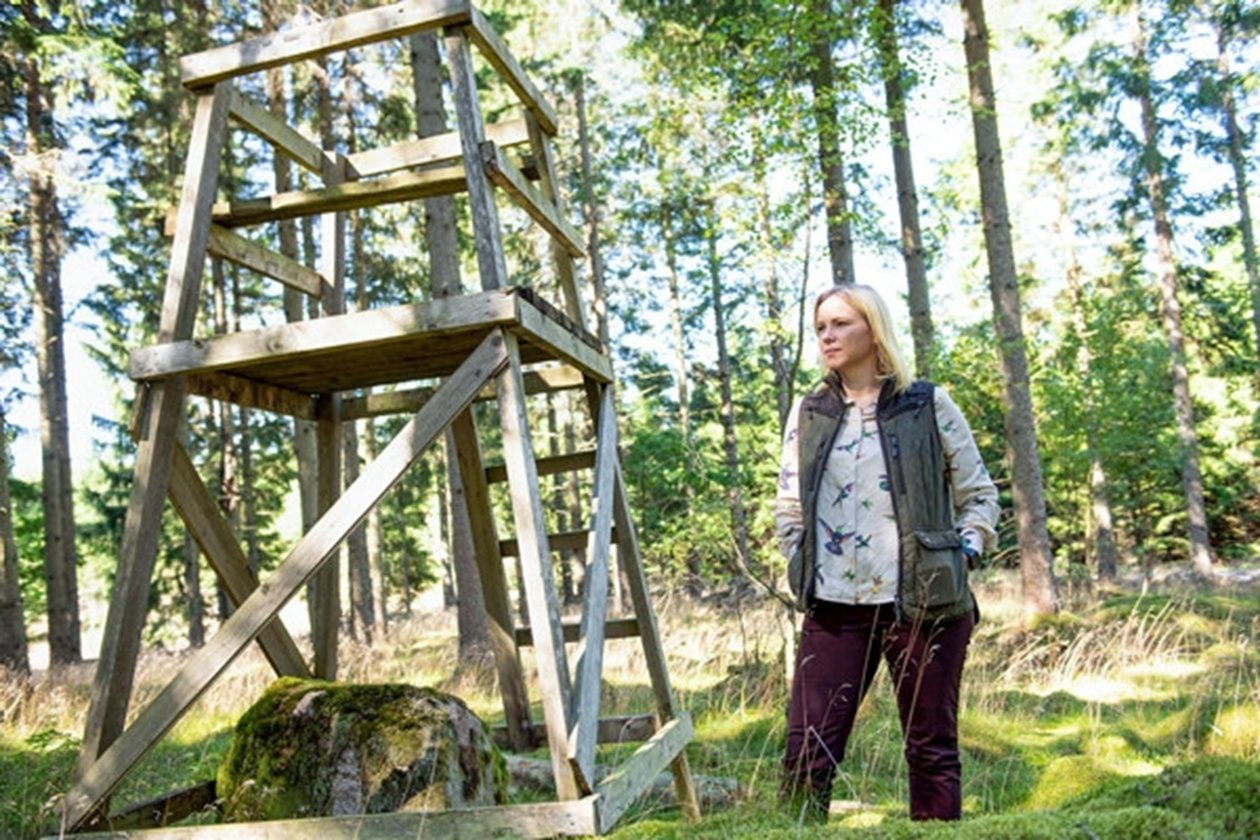I am completely sold on the cooperative model

Even as a child, Mikaela Johnsson knew that she wanted to devote her life to the green economy. Exactly what form that would take, she did not know. But care for the earth, and life on earth, were her calling.

”I grew up in Trollhättan, on a dairy farm that later switched to grain cultivation and forestry,” she says. ”The family was very interested in forests and I have always spent a lot of time in that environment. Nevertheless, it is only in recent years that the forest has become a particular interest. When I was younger I thought forestry was all a bit slow. Now I see the appeal of it - about growing it for the next generation.”
Pigs, grain and forest
Mikaela decided early on to attend a natural farming high school and then studied farm management at Alnarp in Skåne, which is where she met Christian.
”When we finished at Alnarp, we moved here to Småland and Christian's family farm. As the next generation, we took over the company, started a family and have continued to invest in both agriculture and increased forest area since we took over, just like every generation before us has done.
The basis of the family business is 250 sows and piglet breeding. Grain is grown for the pigs on 180 hectares and the farm is basically self-sufficient in fodder. The forest consists of 450 hectares of productive woodland and there is also a game enclosure on the property.
”We fenced in the pasture many years ago,” says Mikaela. ”Now we offer stealth hunts in the enclosure, where we have fallow deer and mouflon (wild sheep).”
There are three employees on the farm. Two work with the pigs and one alternates between animals, fields and forest.
”In addition, we have a lot of help from my father-in-law Ingemar, who, among other things, shoots a lot in the forest. He knows the property inside out and has great insights about what has and hasn't worked over the years. The knowledge of the older generation is so valuable.”
A strong commitment
Mikaela has always had a strong commitment as a farmer, forester and entrepreneur.
”I think a lot about our work, have views and ideas, and am proud of what we do as entrepreneurs, which I am always happy to talk about,” she says. ”Because we are part of various associations, I have met many elected officials over the years and along the way I myself have become involved in issues that I think are important.”
About ten years ago, Mikaela became involved in a project around LRF's (the Federation of Swedish Farmers) food strategy. She discovered that it was both enjoyable and rewarding to work as an elected official, was later elected to LRF's regional board and three years ago took the step up to LRF's national association board.
”In the meantime, I have also had other assignments of various kinds, including in matters surrounding game, water and the economy. But there has always been a focus on the green industries and the opportunities to run businesses in the countryside.”
She thinks the water issue is particularly important. The river Lagan runs through the garden and the family has the privilege of having their boat at the end of the lawn.
”No one is as dependent on good water as those of us who live off the land,” she says.” Here, both fields and forest are unusually close to the water, so it has been natural for me to protect that water. For example, I have sat on Lagan's water council and on the Baltic Sea Stewardship collaborative project on eutrophication run by, among others, LRF and the World Wildlife Fund (WWF). However, I stepped down from those responsibilities last spring to make room in the calendar for, among other things, the board position in Södra.
Membership matters
When Mikaela was elected to Södra's board, she had experience with LRF on her CV, but no previous positions of responsibility within Södra.
”The environment, water and the economy are issues that are highly topical within Södra,” she says. ”After my years within LRF, I also have an understanding of the major economic factors. Other issues I am passionate about are economic policy and cooperation. I am completely sold on cooperation and am convinced that there are great advantages in cooperating financially. Just look at Södra and the strength the members have built together over the years. With our competitive industry, we can still make money from our forest.”
The membership issue is particularly close to Mikaela's heart.
We must maintain constant contact with the members. Membership democracy needs to work and it is important that the individual forest farmer feels that he or she is actually part of Södra. Södra is not only a business partner, but all members are also part of the association. We have the opportunity to make our voices heard, influence decisions and even bring about change.
In order for all members to feel at home in the association, Mikaela points out that Södra needs to work constantly on its culture.
”Culture is partly about questions concerning who we are and who we want to be, how we behave and what difference we make. It is partly about the fact that forest ownership is not a uniform experience, which means that Södra needs to be equally relevant for young and older forest owners, for those who live on the farm and those who live in the city. We will offer solutions for many different ways of owning forests. A healthy association can handle having members with different ideas and opinions,” says Mikaela.
”I think that debate and discussion strengthen us. However, I feel that there are fewer motions put to the vote at Södra compared with LRF. There may be various reasons for this, but member democracy is important and both the board and management feel good about the quality of input from members.”
In the same way, she speaks strongly in favour of management, the board and other elected representatives meeting the members at forest evenings and other gatherings.
”A cooperative committee has recently been created in the board, with the task of processing member issues and cooperative issues before they reach the board. I sit on that committee and although everything is still new, I think it shows how important these issues are. Now I am very much looking forward to the autumn board meetings and forest evenings. It is great to talk to other forest owners and I feel that members are proud of their association. It is a feeling I share with them.”
The clearing saw is a friend
Mikaela and Christian are to some extent independent of each other in the forest. There are both harvesters and forwarders in the machine park for undertaking all kinds of operations.
”I don't drive them myself,” says Mikaela, ”but the clearing saw, on the other hand, is my friend and I like to take it with me to the forest, work hard and clear my brain for a while.”
The size of the property means that they do not have time to do everything themselves. Södra is engaged for felling and also some clearing, thinning and planting.
”We are careful to follow our forestry plan, to be efficient and not fall behind. That's why we don't shy away from getting help when needed. If we are to be on top of things and maintain growth, we need to take the right measures at the right time.”
The forest is dominated by spruce, but the aim is to save broadleaves where possible to create mixed forests.
”We are also trying to bring in more pine, but so far it has been impossible due to grazing damage from deer and moose.”
Production is the heart of the forestry business, but the ambition is for the production forest to be as close to nature as possible.
”We keep a protective distance from water and work with flowering field edges for the sake of pollinators. When felling, we take the water into account and protect it with barriers. In the same way, we avoid planting right next to the stone walls in the forest. But everything takes time and we won't be able to get around the entire property during our period of stewardship. We must take one step at a time and make efforts that are reasonable and possible given our financial constraints. We are proud of what previous generations have created and now want to do the best we can based on our opportunities and the knowledge we have today.”
Issues for the future
In addition to cooperation and member democracy, Mikaela is particularly passionate about business policy.
”There is a forest debate going on where many people have opinions about how we should use the forest and whether we should use it at all,” she says. ”It's an important issue for the future, but I don't think we need to be overly concerned. Rather, the debate is an opportunity and a showcase where we can talk about what we do. But we must be humble and non-confrontational. Every forest owner is an ambassador who can tell a story and influence the debate.”
She also sees the debate as an opportunity for development, where both sides can learn something new and where constructive ideas can be born.
”I feel that there is a pride in Swedish forestry in most political parties. Then, of course, we have what happens at EU level as well, but we have good coverage in Brussels.”
Mikaela believes in collaborations within business policy, both with LRF and with other forest owners' associations.
”Communication and influence cost a lot of money, so it's smart to collaborate whenever possible. In general, I believe in collaborating with others, even with organizations that don't always think like us. Our questions require common solutions, because there are no easy answers. Those who come up with simple answers are usally wrong.”
Another future question concerns the market and how it will develop. How Södra as an association can be strong and stable through both good and more troubled times.
”Climate change is real,” says Mikaela. ”Products, materials and fuels must be replaced, and the forest can provide many of the solutions. In order to navigate correctly, we need to be clear about where the forest will do the most good and how it can be paid for. This is important if the forest farm is to continue making money. My vision is that we will build Södra for many generations to come; that we dare to be as long-term within Södra as we are at the forest farm when we plant something which will grow for 80 years.”
Regardless of how Södra and the products from the forest look in the future, the association must remain rooted in the forest farm.
”Södra exists for the individual forest farmer,” she says. ”The member is at the centre. It is important to me and something that requires constant adaptation, especially now when forest ownership is changing and different members have such different needs and interests.”
Hunting and orienteering
Free time is spent hunting and with the family, which in addition to Christian includes their children Lisa, 14, Jakob, 7, and Joel who is 5.
”Hunting has been a big part of my life since I was very young,” says Mikaela. ”The moose hunt is an important tradition. We also hunt wild boar, but mostly because we have to. It is an animal that is difficult for agriculture to live alongside.”
After daughter Lisa started orienteering with the local association FK Finn, the whole family grabbed the map and compass.
"We might not be very good at it, but we think it's fun. It is also interesting to see the forest from different perspectives, such as forest owners, hunters, orienteers and mushroom pickers, for example. The forest has so much to give.
The family is also interested in history and the world outside the farm.
”We talk a lot about society, where we come from and where we are going. For some reason, I have long been fascinated by Ukraine. Christian and I were there in 2018 and visited Kyiv and Chernobyl, among other places. If possible, that journey makes the ongoing war feel even more tragic and awful. Otherwise, our main interest is to live our life here on the farm. There are, of course, hard days here too, but a prerequisite for running a business in the countryside is that you love what you do.”

Show all content for topic
Subjects: Pulp
